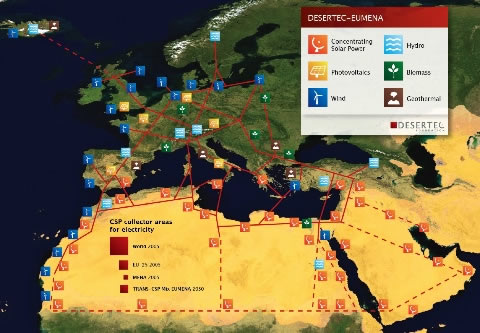 European solar power from African deserts?Jun 18, 2009 - James Kanter - The New York Times
Germany has become a global leader in solar energy by building up a substantial industry at home. Can the country now repeat the feat in North Africa? Munich Re, an insurance company, is leading efforts to garner support for a vast project, dubbed Desertec, to collect energy at solar farms in countries like Tunisia and then send it to Europe in the form of electricity. Munich Re wants other companies like the giant engineering group Siemens, Deutsche Bank, and utilities like RWE and E.ON to become involved. Under the plan, energy would be gathered mostly using concentrating solar power, a technology that uses mirrors to harness rays from the sun to produce steam and drive turbines that make electricity. The power would then be delivered to Europe through high-voltage direct current (HVDC) cables. The converter stations to operate these cables are generally more expensive than the stations associated with alternating current cables, but HVDC cables are far better at conserving power over long distances. The project could turn out to be one of the largest clean power initiatives in the world, providing 15 percent of Europe’s energy needs. But some commentators questioned the wisdom of putting renewable energy hubs in a potentially unstable part of the world, while German media appeared divided on the virtues of the project. According to Spiegel Online, Die Welt, a conservative daily, took a positive view, writing that power from desert solar plants would turn out to be cheaper than power from solar panels installed on German roofs. Handelsblatt, a business daily, was also favorable, writing that subsidies to the desert project “would, for once, make sense.” But the left-leaning daily newspaper Die Tageszeitung warned that a new focus on building a solar hub in Africa could become an excuse for the government to ease back on support for domestic solar projects, which it said “would be a disaster.” |
Updated: 2003/07/28
